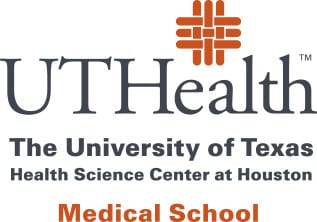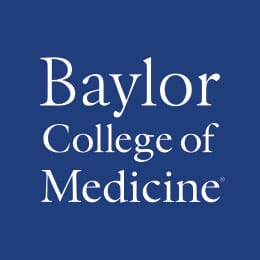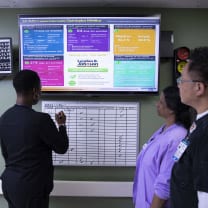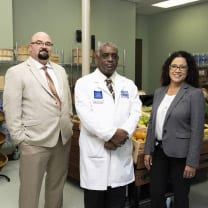![]()
coordinating care across the county
Harris Health System is more than emergency departments, world-class trauma centers, award-winning neonatal ICUs and advanced operating suites. We’re more than community health centers, specialty clinics, school-based clinics, mobile units and full-service hospitals. More than doctors, surgeons, researchers, nurses and technicians who come from some of the highest-ranked medical schools in the nation.
We’re more because we understand the importance of developing relationships with patients beyond a single clinic visit or medical emergency. When our primary care doctors and specialists are coordinating care for every patient and using the full resources of our system, that’s when we’re doing our best work. That’s when we’re doing what we’re built for.
Being the first accredited healthcare institution in Harris County designated by the National Committee for Quality Assurance as a Level 3 patient-centered medical home validates our commitment to a coordinated care approach. We’re one of the largest systems in the country to achieve that standard.
Harris Health System is more than emergency departments, world-class trauma centers, award-winning neonatal ICUs and advanced operating suites. We’re more than community health centers, specialty clinics, school-based clinics, mobile units and full-service hospitals. More than doctors, surgeons, researchers, nurses and technicians who come from some of the highest-ranked medical schools in the nation.
We’re more because we understand the importance of developing relationships with patients beyond a single clinic visit or crisis situation. When our primary care doctors and specialists are coordinating care for every patient and using the full resources of our system, that’s when we’re doing our best work. That’s when we’re doing what we’re built for.
Being the first accredited healthcare institution in Harris County designated by the National Committee for Quality Assurance as a Level 3 patient-centered medical home validates our commitment to a coordinated care approach. We’re one of the largest systems in the country to achieve that standard.
scope of services
Our services range from the most basic primary care to the most complicated trauma and emergency care and includes innovative treatments like robot-assisted surgery and peritoneal dialysis.



hospitals
(including a Level I and a Level III trauma center)



community health centers



outpatient pharmacies





same-day clinics





school-based clinics



large
multi-specialty clinics






dental
center






dialysis
center






geriatric assessment center



homeless shelter clinics
+ mobile immunization and medical outreach program
scope of services
Our services range from the most basic primary care to the most complicated trauma and emergency care and includes innovative treatments like robot-assisted surgery and peritoneal dialysis.



hospitals
(including a Level I and a Level III trauma center)



community health centers



outpatient pharmacies





same-day clinics





school-based clinics



large multi-specialty clinics






dental
center






geriatric assessment center



homeless shelter clinics
+ mobile immunization and medical outreach program
accessibility of services
Our doctors, specialists and staff are at hospitals, health centers and clinics across the community for easier patient access and a better patient experience.
accessibility of services
Our doctors, specialists and staff are at hospitals, health centers and clinics across the community for easier patient access and a better patient experience.
singular dedication
Every physician, researcher, nurse, technician, caregiver and support staff member brings a singular focus to contribute to the best patient experience and outcome.
singular dedication
Every physician, researcher, nurse, technician, caregiver and support staff member brings a singular focus to contribute to the best patient experience and outcome.
2,191
medical staff and
physicians
2,367
nursing staff
1,276
allied health professionals and pharmacy staff
677
patient business services









medical school partnerships
Harris Health is a teaching system for the renowned Baylor College of Medicine, McGovern Medical School at UTHealth and The University of Texas MD Anderson Cancer Center. We train the next generation of healthcare providers on the latest clinical advances and technological breakthroughs.
medical staff and
physicians
nursing
staff
allied health professionals
and pharmacy staff
patient business
services
medical school partnerships
Harris Health is a teaching system for the renowned Baylor College of Medicine, McGovern Medical School at UTHealth and The University of Texas MD Anderson Cancer Center. We train the next generation of healthcare providers on the latest clinical advances and technological breakthroughs.









improvements
Maintaining our position as the leading public healthcare system for Harris County requires consistently investing in our facilities, equipment and technology.
Here are some of the highlights from FY 2019.
improvements
Maintaining our position as the leading public healthcare system for Harris County requires consistently investing in our facilities, equipment and technology.
Here are some of the highlights from FY 2019.
Ben Taub Hospital
The $70 million modernization of Ben Taub Hospital’s surgical suites carried over into FY 2019, with major portions of construction now complete and plans to open the new suites by late 2019:
- Seven new operating suites, including two hybrid ORs equipped with advanced imaging
- New blood bank, sterile supply and oral surgery suites
- Buildout of a new USP 800-compliant inpatient pharmacy
Other non-operative suite projects at the hospital included:
- New fencing and lighting for all parking garage and exterior walkways updated to safer, brighter, more efficient LED
- Conversion of all four-bed units to semi-private rooms
- Completion of the chilled water and steam systems move to TECO, changing the energy footprint across the campus
- Completion of the design component of the new emergency center, with permitting in progress for the renovation of the entire first floor and plans to begin construction in December
Ben Taub Hospital
The $70 million modernization of Ben Taub Hospital’s surgical suites carried over into FY 2019, with major portions of construction now complete and plans to open the new suites by late 2019:
- Seven new operating suites, including two hybrid ORs equipped with advanced imaging
- New blood bank, sterile supply and oral surgery suites
- Buildout of a new USP 800-compliant inpatient pharmacy
Other non-operative suite projects at the hospital included:
- New fencing and lighting for all parking garage and exterior walkways updated to safer, brighter, more efficient LED
- Conversion of all four-bed units to semi-private rooms
- Completion of the chilled water and steam systems move to TECO, changing the energy footprint across the campus
- Completion of the design component of the new emergency center, with permitting in progress for the renovation of the entire first floor and plans to begin construction in December
Ben Taub Hospital
The $70 million modernization of Ben Taub Hospital’s surgical suites carried over into FY 2019, with major portions of construction now complete and plans to open the new suites by late 2019:
- Seven new operating suites, including two hybrid ORs equipped with advanced imaging
- New blood bank, sterile supply and oral surgery suites
- Buildout of a new USP 800-compliant inpatient pharmacy
Other non-operative suite projects at the hospital included:
- New fencing and lighting for all parking garage and exterior walkways updated to safer, brighter, more efficient LED
- Conversion of all four-bed units to semi-private rooms
- Completion of the chilled water and steam systems move to TECO, changing the energy footprint across the campus
- Completion of the design component of the new emergency center, with permitting in progress for the renovation of the entire first floor and plans to begin construction in December
Ben Taub Hospital
The $70 million modernization of Ben Taub Hospital’s surgical suites carried over into FY 2019, with major portions of construction now complete and plans to open the new suites by late 2019:
- Seven new operating suites, including two hybrid ORs equipped with advanced imaging
- New blood bank, sterile supply and oral surgery suites
- Buildout of a new USP 800-compliant inpatient pharmacy
Other non-operative suite projects at the hospital included:
- New fencing and lighting for all parking garage and exterior walkways updated to safer, brighter, more efficient LED
- Conversion of all four-bed units to semi-private rooms
- Completion of the chilled water and steam systems move to TECO, changing the energy footprint across the campus
- Completion of the design component of the new emergency center, with permitting in progress for the renovation of the entire first floor and plans to begin construction in December
keeping the wheels of progress in motion
Ben Taub has initiated new capital projects that tie into the larger emergency center project, including the overhaul and renovation of five critical care rooms. The project that began in January was finished on Memorial Day and completely changed the workflow in the spaces, adding new radiology systems, better procedure lights, new physician workstations and improved infection protection. The new rooms give Ben Taub staff the ability to perform emergent dialysis for the high volume of patients who come in critically unstable.



Our teams are energized by the changes we’re implementing throughout the hospital. Our patient experiences are more positive, and everything flows better.
Jason Kunnacherry, MBA, MHA, FACHE
Vice President, Operations
Ben Taub Hospital
keeping the wheels of progress in motion
Ben Taub has initiated new capital projects that tie into the larger emergency center project, including the overhaul and renovation of five critical care rooms. The project that began in January was finished on Memorial Day and completely changed the workflow in the spaces, adding new radiology systems, better procedure lights, new physician workstations and improved infection protection. The new rooms give Ben Taub staff the ability to perform emergent dialysis for the high volume of patients who come in critically unstable.



Our teams are energized by the changes we’re implementing throughout the hospital. Our patient experiences are more positive, and everything flows better.
Jason Kunnacherry, MBA, MHA, FACHE
Vice President, Operations
Ben Taub Hospital
Lyndon B. Johnson Hospital
In 2016, senior leadership began a journey to improve quality of care and patient safety, maximize bed capacity and improve patient experiences at Lyndon B. Johnson Hospital. November 2018 marked the completion of a major conversion project of existing patient beds to semi-private beds through a combination of three IMUs (intermediate care units) and five medical-surgical-telemetry units. This integration of services provides better communication and more efficiency between doctors, surgeons, nurses, social workers, pharmacy personnel and patients and reduces the number of moves a patient has to make.
Intermediate care is the level just below intensive care. The conversion process involved extensive training, both didactic and hands-on, for the nurses working the new units, and now, they are all certified for ACLS (advanced cardiac lifesaving), a standard typically seen only at advanced levels of care.
Lyndon B. Johnson Hospital
In 2016, senior leadership began a journey to improve quality of care and patient safety, maximize bed capacity and improve patient experiences at Lyndon B. Johnson Hospital. November 2018 marked the completion of a major conversion project of existing patient beds to semi-private beds through a combination of three IMUs (intermediate care units) and five medical-surgical-telemetry units. This integration of services provides better communication and more efficiency between doctors, surgeons, nurses, social workers, pharmacy personnel and patients and reduces the number of moves a patient has to make.
Intermediate care is the level just below intensive care. The conversion process involved extensive training, both didactic and hands-on, for the nurses working the new units, and now, they are all certified for ACLS (advanced cardiac lifesaving), a standard typically seen only at advanced levels of care.
Lyndon B. Johnson Hospital
In 2016, senior leadership began a journey to improve quality of care and patient safety, maximize bed capacity and improve patient experiences at Lyndon B. Johnson Hospital. November 2018 marked the completion of a major conversion project of existing patient beds to semi-private beds through a combination of three IMUs (intermediate care units) and five medical-surgical-telemetry units. This integration of services provides better communication and more efficiency between doctors, surgeons, nurses, social workers, pharmacy personnel and patients and reduces the number of moves a patient has to make.
Intermediate care is the level just below intensive care. The conversion process involved extensive training, both didactic and hands-on, for the nurses working the new units, and now, they are all certified for ACLS (advanced cardiac lifesaving), a standard typically seen only at advanced levels of care.
daily huddles to enhance safety and open communications
A new initiative supporting our commitment to our goal of zero harm to patients has led to electronic quality boards throughout the hospital. These boards make quality goals, patient satisfaction scores and individual department initiatives prominently available to teams who meet around them daily and provide a high level of transparency to patients and their families.



daily huddles to enhance safety and open communications
A new initiative supporting our commitment to our goal of zero harm to patients has led to electronic quality boards throughout the hospital. These boards make quality goals, patient satisfaction scores and individual department initiatives prominently available to teams who meet around them daily and provide a high level of transparency to patients and their families.












